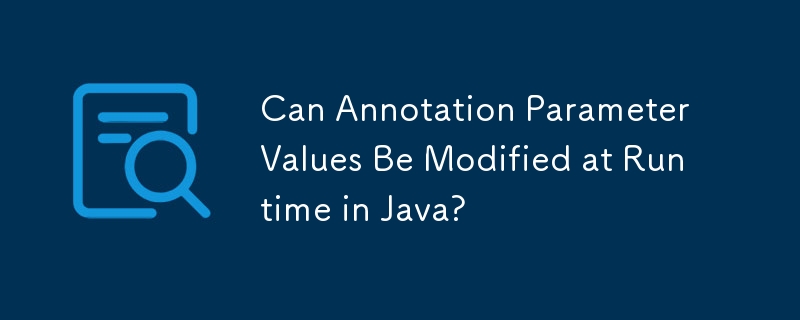Java中註解參數值可以在執行時期修改嗎?
- Linda Hamilton原創
- 2024-12-11 18:51:15469瀏覽

在運行時修改註釋參數值
想像一下,遇到一個帶有用特定參數值修飾的註釋的類,並且您希望更改它運行時的值。在已經載入到JVM中的編譯類別中更改註解參數值是否可行?
解:
是的,可以修改註解參數運行時的值。可以採用以下方法:
@SuppressWarnings("unchecked")
public static Object changeAnnotationValue(Annotation annotation, String key, Object newValue) {
Object handler = Proxy.getInvocationHandler(annotation);
Field f;
try {
f = handler.getClass().getDeclaredField("memberValues");
} catch (NoSuchFieldException | SecurityException e) {
throw new IllegalStateException(e);
}
f.setAccessible(true);
Map<String, Object> memberValues;
try {
memberValues = (Map<String, Object>) f.get(handler);
} catch (IllegalArgumentException | IllegalAccessException e) {
throw new IllegalStateException(e);
}
Object oldValue = memberValues.get(key);
if (oldValue == null || oldValue.getClass() != newValue.getClass()) {
throw new IllegalArgumentException();
}
memberValues.put(key, newValue);
return oldValue;
}
用法:
@Retention(RetentionPolicy.RUNTIME)
@Target(ElementType.TYPE)
public @interface ClassAnnotation {
String value() default "";
}
@Retention(RetentionPolicy.RUNTIME)
@Target(ElementType.FIELD)
public @interface FieldAnnotation {
String value() default "";
}
@Retention(RetentionPolicy.RUNTIME)
@Target(ElementType.METHOD)
public @interface MethodAnnotation {
String value() default "";
}
@ClassAnnotation("class test")
public static class TestClass {
@FieldAnnotation("field test")
public Object field;
@MethodAnnotation("method test")
public void method() {}
}
public static void main(String[] args) throws Exception {
final ClassAnnotation classAnnotation = TestClass.class.getAnnotation(ClassAnnotation.class);
System.out.println("old ClassAnnotation = " + classAnnotation.value());
changeAnnotationValue(classAnnotation, "value", "another class annotation value");
System.out.println("modified ClassAnnotation = " + classAnnotation.value());
Field field = TestClass.class.getField("field");
final FieldAnnotation fieldAnnotation = field.getAnnotation(FieldAnnotation.class);
System.out.println("old FieldAnnotation = " + fieldAnnotation.value());
changeAnnotationValue(fieldAnnotation, "value", "another field annotation value");
System.out.println("modified FieldAnnotation = " + fieldAnnotation.value());
Method method = TestClass.class.getMethod("method");
final MethodAnnotation methodAnnotation = method.getAnnotation(MethodAnnotation.class);
System.out.println("old MethodAnnotation = " + methodAnnotation.value());
changeAnnotationValue(methodAnnotation, "value", "another method annotation value");
System.out.println("modified MethodAnnotation = " + methodAnnotation.value());
}
此方法透過直接修改註解的內部表示來操作。因此,後續反射呼叫將檢索更改後的參數值。它的優點是不需要創建新的註釋實例,從而消除了對特定註釋類別的先驗知識的需要。此外,透過保持原始註釋實例不變,可以最大限度地減少副作用。
以上是Java中註解參數值可以在執行時期修改嗎?的詳細內容。更多資訊請關注PHP中文網其他相關文章!
陳述:
本文內容由網友自願投稿,版權歸原作者所有。本站不承擔相應的法律責任。如發現涉嫌抄襲或侵權的內容,請聯絡admin@php.cn

